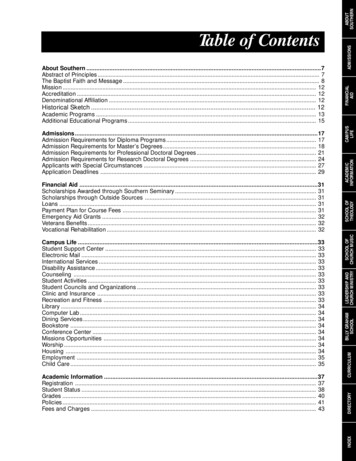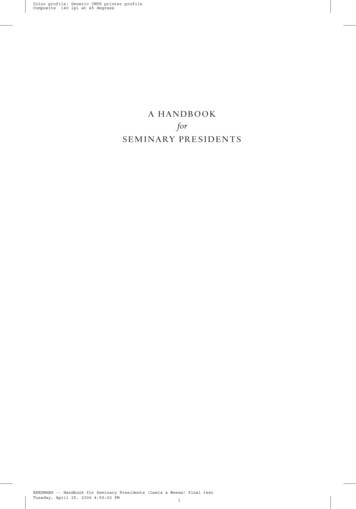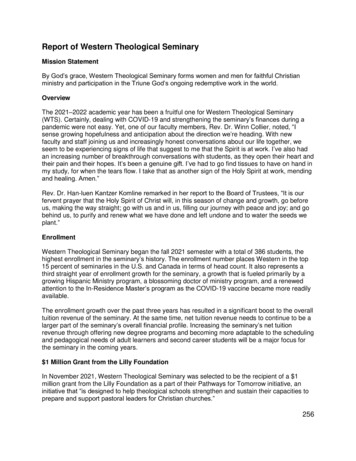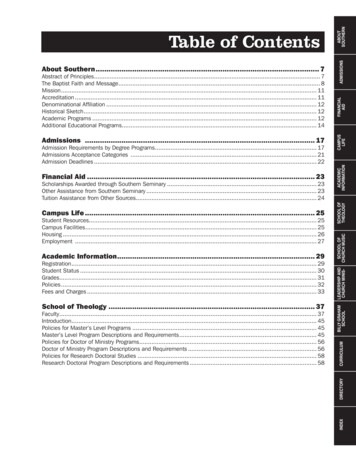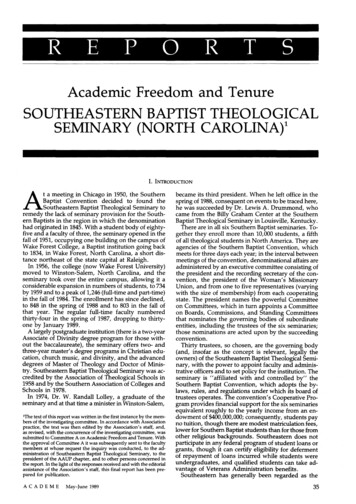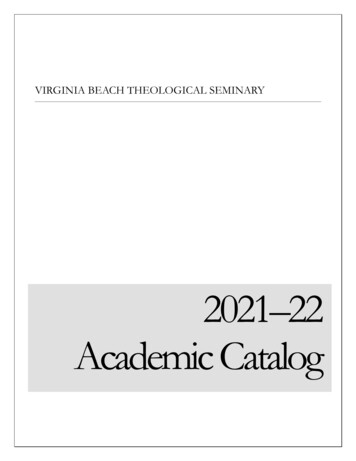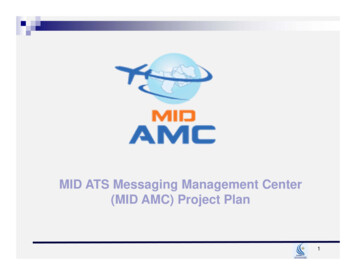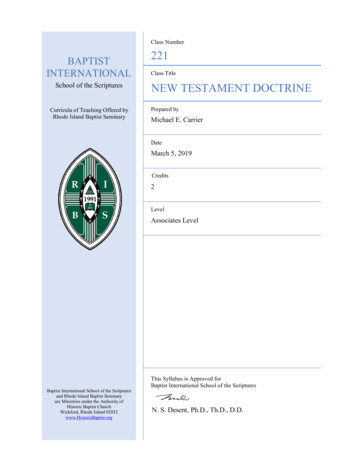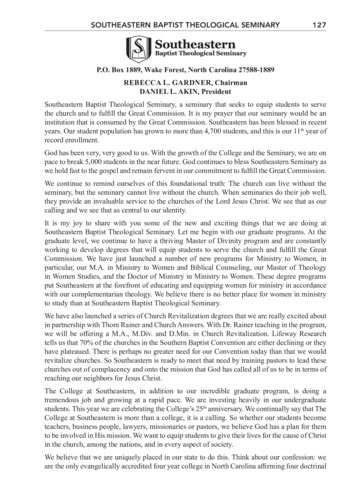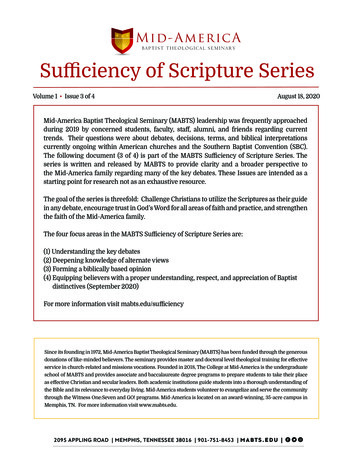
Transcription
Mid-AmericaBaptist Theological SeminarySufficiency of Scripture SeriesVolume 1 Issue 3 of 4August 18, 2020Mid-America Baptist Theological Seminary (MABTS) leadership was frequently approachedduring 2019 by concerned students, faculty, staff, alumni, and friends regarding currenttrends. Their questions were about debates, decisions, terms, and biblical interpretationscurrently ongoing within American churches and the Southern Baptist Convention (SBC).The following document (3 of 4) is part of the MABTS Sufficiency of Scripture Series. Theseries is written and released by MABTS to provide clarity and a broader perspective tothe Mid-America family regarding many of the key debates. These Issues are intended as astarting point for research not as an exhaustive resource.The goal of the series is threefold: Challenge Christians to utilize the Scriptures as their guidein any debate, encourage trust in God’s Word for all areas of faith and practice, and strengthenthe faith of the Mid-America family.The four focus areas in the MABTS Sufficiency of Scripture Series are:(1) Understanding the key debates(2) Deepening knowledge of alternate views(3) Forming a biblically based opinion(4) Equipping believers with a proper understanding, respect, and appreciation of Baptistdistinctives (September 2020)For more information visit mabts.edu/sufficiencySince its founding in 1972, Mid-America Baptist Theological Seminary (MABTS) has been funded through the generousdonations of like-minded believers. The seminary provides master and doctoral level theological training for effectiveservice in church-related and missions vocations. Founded in 2018, The College at Mid-America is the undergraduateschool of MABTS and provides associate and baccalaureate degree programs to prepare students to take their placeas effective Christian and secular leaders. Both academic institutions guide students into a thorough understanding ofthe Bible and its relevance to everyday living. Mid-America students volunteer to evangelize and serve the communitythrough the Witness One:Seven and GO! programs. Mid-America is located on an award-winning, 35-acre campus inMemphis, TN. For more information visit www.mabts.edu.2095 APPLING ROAD MEMPHIS, TENNESSEE 38016 901-751-8453 M A BTS . E D U E D Q
Mid-AmericaBaptist Theological SeminarySufficiency of Scripture SeriesVolume 1 Issue 3 of 4August 18, 2020Forming a Biblically Based Opinion:Utilizing Scriptural Sufficiency as a Practical Guide to a Biblical LifestyleBy Michael R. Spradlin, PhDPresident, Chairman of the Evangelism Department, Professor of EvangelismMid-America Baptist Theological SeminaryAbstract: This issue of the Sufficiency of Scripture series furthers the discussion regarding Resolution 9(On Critical Race Theory and Intersectionality) passed at the 2019 Annual meeting of the Southern BaptistConvention. While the first two issues in the series took a more explanatory and diagnostic approach to theterms and technicalities supporting the alternate views of Resolution 9, this issue will provide a pastoralfocus on the sufficiency of Scripture, the role of supplemental tools in a believer’s decision making, andhow one should form a biblically based opinion when new ideologies are presented. The goal of this issueis for Mid-America’s students, faculty, staff, and friends to be confident in their answer to the followingquestion: “Should SBC churches and believers use CRT/I as supplemental tools to the Bible for meetingthe social and spiritual needs of society and bringing it into a right relationship with God?”IntroductionIn Issues 1 and 2 of the Mid-America Sufficiency of Scripture series, the concepts of Critical RaceTheory and Intersectionality (CRT/I) were introduced and discussed including key summaries along withorigin information. The conclusions of the previous issues in the Sufficiency of Scripture series expressthe clear and present danger of humanistic philosophies and ideas infiltrating biblical Christianity. Thisparticular edition of the Sufficiency of Scripture Series will seek to reinforce the key points of Issues1 and 2 although with less focus on the ideologies and frameworks of CRT/I as these topics were welldiscussed in this series’ earlier issues. The author recommends a thorough reading of the previous twoissues before continuing.This issue will develop a template for dealing with the current debate and any future debateswhich may seek to influence the believer’s understanding of the Scripture. This includes a focus onexplaining practical steps Christians may follow to form a biblical opinion, and then the application ofthese steps to a practical example and the debate around Resolution 9. A paper of this length prohibits anin-depth explanation of every aspect within this debate. This issue will deal broadly with these topics andprioritize a pastoral analysis of the debates discussed.1
CRT/I have evolved from ideas in the halls of acedemica to a major discussion among churchmembers. While CRT/I are currently in vogue, other ideologies will appear eclipsing them as the nextconcerning ideologies to embrace. Dealing with the current threats of CRT/I is important, but learninghow to assess each new philosophy biblically is essential.Resolution 9 reflects a debate that detracts from directly studying the Bible and relying on itssufficiency. The SBC, known for years as a denomination that maintains a high view of Scripture,faced a similar struggle in the previous generation with the “Battle for the Bible” debate. This debateincluded arguments over terms such as infallibility, inerrancy, and whether certain descriptions of theBible were an adequate and truthful reflection of Scripture. About biblical inerrancy, L. Russ Bushwrote:Some critics claim that belief in inerrancy will destroy scholarly activity. Rather than destroy,however, it has been the touchstone of some of the best in recent scholarship. Whenever someoneturns away from the givenness of the objective truthfulness of the biblical text and substitutesthe supposed truthfulness of even the most reasonable speculation, the epistemological structureof orthodox Christianity is at that point lost.1Having already fought and won the battle for the Bible’s inerrancy, the current debate is how best toanswer the question, “Is the Bible sufficient to lead believers to salvation, guide them to Christianliving, and answer all aspects of faith and life?”To avoid drifting doctrinally, every believer and church must maintain a strong biblicalfoundation which is built on an in-depth knowledge of the Bible. Hebrews 2:1 says, “For this reasonwe must pay closer attention to what we have heard, so that we do not drift away from it” (NASB).This does not presuppose that one must have a degree from a Christian institution of higher learningor a seminary. Every born-again believer must become intimately acquainted with the Scripture for hisor her spiritual growth and personal benefit.The Sufficiency of ScriptureThe Lord provided the Scripture as a guide for living and knowing Him. As Psalm 119:105says, “Your word is a lamp unto my feet and a light unto my path” (ESV). The Lord inspired the Biblein order that humanity might know absolute truth and not be swayed by the vanity of depraved humanthinking. One should consider Paul’s words to the Ephesians, “As a result, we are no longer to bechildren, tossed here and there by waves and carried about by every wind of doctrine, by the trickeryof men, by craftiness in deceitful scheming” (Eph. 4:14 NASB). The unfailing, inerrant Word of Godgrounds the believer and protects him or her from many dangers.The best practice is to let the Bible speak about the Bible. Psalm 19 affirms the Bible as trueand emphasizes all human thought and action must conform to Scripture. It is a love song to God’sWord describing it as perfect, sure, right, pure, clean, true, and as “more desirable than gold, yes, thanmuch fine gold; Sweeter also than honey and the drippings of the honeycomb. Moreover, by them [theScriptures] Your servant is warned; In keeping them there is great reward” (Ps. 19:7-14). Once sinners1 L. Russ Bush, “Understanding Biblical Inerrancy,” Southwestern Journal of Theology, Volume 50, Number 1, Fall 2007:39-40. Online Edition: nt/docs/journal/50 1/50.1 Bush.pdf.2
are born-again, their thoughts and outward actions must be conformed to the will of God. Jesus Christchanges the believer from the inside out through His living Word collected and preserved for us in theScripture.The Apostle Paul states in 2 Timothy 3:16-17, “All Scripture is inspired by God and profitablefor teaching, for reproof, for correction, for training in righteousness so that the man of God maybe adequate, equipped for every good work.” This passage contains two universal truths and theirapplications. The first universal truth appears in the phrase “all Scripture.” Thomas D. Lea wroteof this phrase: “It is clear from the context that Paul was not merely referring to a single passage ofScripture. He was making a collective reference to all of Scripture or a partitive reference to eachpassage of Scripture.”2 All of the Bible is fully inspired by the Holy Spirit. The readers are not givenliberty, under any circumstance, to alter the text or the meaning of the text.Another universal truth comes at the end of the passage. The phrase “equipped for every goodwork” shows that all of human life, attitude, and conduct should be informed and guided by theScriptures. Lea explains, “If Timothy would nurture his spiritual life in the Scriptures that he woulduse in his ministry, he would be fully qualified and prepared to undertake whatever tasks God putbefore him.”3 This truth leads to the practical application as verse sixteen gives a detailed list of thevarious ways in which the truth of the Bible can be applied to bring out God’s desired results in andthrough believers. “Teaching, reproof, correction, and training in righteousness” comprehensivelyoutline that the Scripture can, and indeed must, have dominion over every aspect of human life andconduct.Not only is the Bible applicable, it is also adequate for every situation. The Bible is absolutetruth and above human thought. It stands above human knowledge and experience and was neverintended to serve as a supplement to human knowledge and experience. W. A. Criswell wrote, “TheBible has been the mightiest factor in shaping the moral progress of the entire race.”4 Morality needs anunchanging foundation which God provides to humanity by a revelation of Himself through His Word.Removing the foundation of God’s absolute truth makes all human attempts to create a successful andlasting moral-ethical code anemic and unsuccessful.In contrast, the doctrine of sin shows human beings are innately wicked. “The heart is moredeceitful than all else and is desperately sick; Who can understand it?” (Jer. 17:9). In his secondepistle, Peter says, “But know this first of all, that no prophecy of Scripture is a matter of one’s owninterpretation” (2 Pet. 1:20). Again, the Scriptures emphasize that human thinking and experiencemust always submit to the Word of God. What may seem sensible from a human point of view maybe completely contradictory to the revealed truth of God. Thus, whenever believers attempt to usehuman-created analytical tools or lenses to interpret the Bible they open themselves and the process ofunderstanding God’s Word up to fallacy. Humanity is mistaken to think either a believer or unbelievercould improve upon the holy Scripture. Paul explains his own ministry was geared “so that your faithwould not rest on the wisdom of men, but on the power of God” (1 Cor. 2:45). Christians would dowell to follow Paul’s advice and practice trust in God rather than man.2 Thomas D. Lea and Hayne P. Griffin, Jr., 1, 2 Timothy Titus. In The New American Commentary, vol. 34, ed. David S.Dockery (Nashville: Broadman Press, 1992), p. 235.3 Lea and Griffin, p. 238.4 W. A. Criswell, Why I Preach That the Bible Is Literally True, (Nashville: Broadman Press, 1969), p. 17.3
Given the nature of the Scriptures and the nature of humankind, the doctrine of the sufficiencyof Scripture is not only important but also essential to orthodox Christian belief. When filtered, biblicaldoctrines can be diluted and, therefore, not as God has given them. As Henry Thiessen wrote, “TheBible is superior to all other religious books in content. It sets up the highest ethical standards, enjoinsthe most absolute obedience, denounces every form of sin, and yet informs the sinner how he canbecome right with God.”5 The proof of the Bible’s purity, profitability, and perfection should lead thebeliever to the following summary statements regarding the sufficiency of Scripture.The Bible is completely true. The Bible addresses the fact that divinely revealed truth is absolute andnot open to individual opinions. Second Peter 1:21 says, “For no prophecy was ever made by an act ofhuman will, but men moved by the Holy Spirit spoke from God.” God spoke, and it was written. Eventhough the characteristics, style, and vocabulary of the human writers is present, the end product is therevealed Word of God. Thiessen states, “The Bible claims to be not only a revelation from God, but aninfallible record of that revelation.”6 As such, the Bible is exactly what God intended.All Scripture came by inspiration of God the Holy Spirit. The truth of Scripture is determinedby the quality of the author who is the immutable, almighty, holy, and perfect God. Since God isperfect, His Word is perfect. The truth of Scripture is not determined by the opinions or interpretationsof the community of faith or by any earthly entity. God’s divine inspiration through Scripture hasbeen, is, and always will be true because it is His word.The Bible can be understood. The Bible is a living book which simultaneously reflects deep conceptsand inspires lifelong study though written in simple terms. A small child can grasp eternal truths froma certain passage of Scripture while an experienced theologian can grapple with the deep meaningof the same text. Since the same Holy Spirit who wrote the texts resides in every believer, Christianshave the Author of the Bible as their guide. The Bible is not merely the plan for godly living but theconduit whereby “His divine power has granted to us everything pertaining to life and godliness,through the true knowledge of Him who called us by His own glory and excellence” (2 Pet. 1:3).The importance of the biblical languages is reflected in a seminary’s degree requirements.Even with voluminous resources available to the pastor, church staff leader, or missionary, theseseminaries understand the benefit and emphasize the need for a minister to be able to read the Scripturein the original languages. This is due to the strong Baptist emphasis on the authority of Scripture andhow important discerning its true meaning in the original context is for proper understanding andhandling of God’s Word. Mid-America Baptist Theological Seminary describes the core requirementsfor every Master of Divinity degrees as, “All provide a solid foundation with core courses such aspersonal evangelism, missions, theology, Greek and Hebrew, the history of Christianity and otherworld religions, and thorough biblical studies in the New and Old Testament.”7 Mid-America believesministry leaders should be prepared to study the Bible for themselves and not just take the word of ascholar or author as they are preparing to teach, preach, train, and disciple others. The Word of God isthe foundation of the Christian faith and must be treated as such.5 Henry C. Thiessen, Lectures in Systematic Theology, rev. by Vernon D. Doerksen, (Grand Rapids: William B. EermansPublishing Company, 1979), p. 67.6 Theissen, p. 48.7 Mid-America Baptist Theological Seminary, “Master of Divinity – Frequently Asked Questions” accessed July 15, 2020,https://www.mabts.edu/master-divinity.html.4
Believers submit to the teachings of the Bible. For Christians, the lordship of Christ should be asettled issue. In an article published by the R. G. Lee Society of Union University, Dr. Roger Willmorewrote, “I must say again that the most important truth in relation to the Christian experience is thelordship of Jesus Christ.”8 As our Lord, we defer to the revealed truth of God through the Bible.Obedience to God’s Word even when it speaks against our feelings, inclinations, and comfort is ahallmark of a true Christian.Even in orthodox Christianity, it seems easy for one to head down the slippery slope ofconforming the Scriptures to the individual rather than conforming the individual to the Word of God.Peter warned the early church that “there will also be false teachers among you, who will secretlyintroduce destructive heresies, even denying the Master who bought them, bringing swift destructionupon themselves” (2 Pet. 2:1). This warning should increase our fear of and respect for the Lord.Denying the Master and His Word with our behaviors, beliefs, and teachings will be destructive forthe individual and for corporate groups of believers.Believers apply the teachings of the Bible to their daily living. Believers show their faith in theGod of the Bible through submitting to His perfect Word and applying it to daily living in obedience.Wrongful behavior by people claiming to be Christians is not because the Scripture is lacking inpower or truth but because the believer is lacking in applying the Scripture. The whole counsel ofGod must be preached and taught, believed, and applied to the individual and to the local church.Disciplined and knowledgeable application of the Bible to the sinful self by individuals would ridchurches of many of their offenses today. Biblical Christians will lead to biblical churches which willlead to biblical denominations. Therefore, the application of the Bible and its sufficiency for daily lifeis truly the key and culmination of all the other statements of facts listed above.Forming a Biblically Based OpinionThe Christian life is a matter of knowing and doing the will of God in accordance with theWord of God. Proverbs 25:2 states, “It is the glory of God to conceal a matter, but the glory of kingsto search out a matter.” May the following practical steps from a pastoral heart be of assistance tothose who are “searching out a matter” and seeking to form a biblically based opinion on an issue.The following is a general guideline for forming an opinion based on Scripture not an exhaustiveexplanation or only solution for the topic at hand. It is a simplistic template for practice which, whilebased on unchanging principles and truths, can be adapted for the spiritual maturity of the believerand complexity of the situation.One option for forming a biblically based opinion is to practice the following five commonsensesteps: pray to the Lord for wisdom; read the Bible to learn the mind and will of the Lord; consult withtrusted resources and godly believers; read the Bible again to make sure that the counsel you havesought aligns with Scripture; and finally, pray that the Lord will give the courage to obey.Pray. Ask for wisdom from the Lord. Request wisdom from Him who “gives to all generously andwithout reproach” (James 1:5). He will guide with His Word. The believer needs to ensure ample timeis spent truly seeking God’s face and God’s truth regarding the situation at hand. All biases need tobe acknowledged before the Lord as the believer is seeking whatever is God’s will in a matter and is8 Roger D. Willmore, “The Lordship of Jesus Christ” accessed August 1, 2020, willmore.htm.5
not seeking to validate previously formed opinions. In Matthew 7:7 the Lord Jesus says: “Ask, and itwill be given to you; seek, and you will find; knock and it will be opened to you.” Take this promiseon faith and thank the Lord at the end of each prayer for how He will answer.Read. Read the Bible. This should be a regular part of the Christian life. Believers should saturatetheir lives with the Scriptures. They should read entire books of the Bible at a time and systematicallyread through the whole Bible not just certain texts which speak to a topic of interest. Such a patternof reading will show how the Lord has worked through all of human history to bring about His willand His plan. Spending time in the Bible results in the Word of God residing in one’s heart and mind.God the Holy Spirit will use the Scripture to lead and guide one in His perfect will. ThePsalmist says: “Seven times a day I praise You, because of Your righteous ordinances. Those wholove Your law have great peace, and nothing causes them to stumble. . .I opened my mouth wide andpanted, for I longed for your commandments” (Ps. 119:164-165, 131). God the Holy Spirit will usethe Scripture to lead and guide one in His perfect will. Christ’s followers should always rememberthey come to the Scriptures to receive God’s truth whatever it may be and however it collides withtheir own ideas or biases. It is a weakness when one starts with an assumption and then goes to theBible for verification or validation. One should always start with the Scriptures and stay with theScriptures.Consult. It is biblical and appropriate to ask advice from wise counselors and to seek assistancefrom appropriate Bible-believing, biblically derived resources, but one should not rely too heavilyon resources outside of the Scriptures. Proverbs 19:20-21 states, “Listen to counsel and acceptdiscipline, that you may be wise the rest of your days. Many plans are in a man’s heart, but thecounsel of the Lord will stand.” Proverbs 15:22 states, “Without consultation, plans are frustrated, butwith many counselors they succeed.” Asking advice from those with trusted and observed Christianlives is a wise idea. Pastors and Sunday School teachers as well as believing parents and friends areall excellent resources for wise counsel. Devotional guides, study Bible notes, Bible concordances,Bible dictionaries, and many other resources may be helpful in expounding, cross-referencing, andproviding background and historical information for the Scripture.As one chooses individuals or resources to serve as counsel, one must choose wisely. Notewhat the Psalmist says: “How blessed is the man who does not walk in the counsel of the wicked, norstand in the path of sinners, nor sit in the seat of scoffers! But his delight is in the law of the LORD,and in His law he meditates day and night” (Ps. 1:1-2). The Scriptures warn believers about the harmof bad counsel. Any counsel which says one must look through a filter before seeing the Bible clearlyis unwise. Any counsel which goes against the Scripture is ungodly.As for readings, while devotionals are helpful, believers should focus on reading and learningthe Bible first and foremost because it is the sword of the Spirit and essential for Christian living.Believers should be careful to not spend more time reading about the Bible than reading the Bible.In the introduction to her devotional book, A Lamp Unto My Feet, Elisabeth Elliot explained thisconcept eloquently: “I do not mean the book to be read in place of reading the Bible and meditating.It is only meant to be a help. If you have only five minutes, don’t read my book, read God’s. It willbe a lamp unto your feet.”99 Elliot, Elisabeth. A Lamp Unto My Feet: The Bible’s Light for your Daily Walk. Revell Edition for Kindle published 2014.Grand Rapids, MI.6
Read. After consulting trusted counselors and trustworthy, biblically based resources, one shouldalways return to the Scripture to see if the advice attained agrees with Scripture. This is a criticalbehavior. The people of Berea heard the Apostle Paul gladly, but they also searched the Scripturesto verify what he was saying was of God (Acts 17:10-13). There is no counsel from God which goesagainst the Bible. Even though a trusted advisor may seem wise or be well-meaning, it is essentialthe believer always tests the counsel by the truths of Scripture. Many believers are led astray byothers they trust whose counsel has been flawed by personal desires, biases, or ignorance. Seekingan abundance of counselors is wise as is the biblical vetting and verification of the perspectives thosecounselors provide.Pray. Ask the Lord to make His perfect will clear and request the strength to follow and obey Hiswill. Pray that in all things the Lord Jesus will receive all credit and glory. This prayer delights theheart of God and always fits into His will. Sometimes what has been revealed will be personallycostly and require courage. We remember Jesus says, “If anyone wishes to come after Me, he mustdeny himself, take up his cross daily and follow Me” (Luke 9:23). Jesus exemplified both the courageto obey against feeling and the desire to glorify the Father when He spoke the following wordsforetelling of His death: “Now My soul has become troubled; and what shall I say? ‘Father, save Mefrom this hour’? But for this purpose, I came to this hour. Father, glorify Your name” (John 12:27-28).The words immediately following Jesus’ are a supernatural declaration from the Father, “I have bothglorified it, and will glorify it again” (John 12:29). God will reward obedience.If one is still unsure about the will of God in a matter, then he or she should keep seeking,praying, reading, and consulting until God has made His will apparent. Many times, the Lord doesnot give a simple answer but gives enough light to take one step at a time. Learning, knowing, andfollowing the will of God is a journey. It is important to have spent enough time in prayer on a subjectin order to gain a perspective that holds no selfish ambition, and can say, “not my will, but Yours bedone” while trusting God no matter the outcome. God has promised to answer and guide. One needsonly to continue seeking with patience, and to remember the Lord’s promise, “‘I will be found byyou,’ declares the Lord” (Jer. 29:14).Pastoral ExamplesCopying Someone Else’s Work on an Academic TestUp to this point, the steps to forming a biblically based opinion have been theoreticallydiscussed. Now, each step will be applied to a real-world example. A frequently occurring debate,especially among students, is the question of cheating on a test. Is cheating on a test wrong? If the goalis to place the correct information on the test, then copying from someone who studied would be avalid method for accomplishing the goal. Does the Bible specifically condemn cheating on a test inschool? If the goal is to produce correct answers, there are multiple ways of attaining the goal. Oneway is to study and learn the material. Another way is to sit beside someone who has studied and copyhis or her work. Both methods achieve the goal of placing the correct answers on the test, yet onlyone way is right.The first step in forming a biblically based opinion is to pray and ask God to reveal His truth.Then, one goes to search God’s word for instruction. In the instance of cheating on a test, the matteris truly about stealing answers, so verses concerning stealing should be consulted. A very familiarverse from the Ten Commandments is, “You shall not steal” (Exod. 20:15). Paul reiterates this to the7
Ephesians when he says, “He who steals must steal no longer, but rather he must labor, performingwith his own hands what is good, so that he will have something to share with one who has need”(Eph. 4:28). The first verse provides the clear instruction that stealing is against God’s moral codeand, therefore, wrong. The second verse provides the additional insight that the opposite of stealing islaboring with one’s own hands. If one takes answers from another who has studied, one profits off ofanother’s labor rather than laboring for one’s self which is the opposite of the Bible’s instruction here;therefore, it is also wrong.In this example, the Bible speaks clearly, and seeking additional counsel may seem like onestep too many. However, discussing the Scripture with others is always beneficial. Questioning trustedcounselors or utilizing biblically derived resources may lead one to additional verses and insights.It cannot be said enough that God never contradicts His written word, so any counsel should bereferenced again through the reading of the Scripture. In the present example, God’s will on the mattercan be clearly seen. One should now seek God’s face again in prayer asking for the strength andcourage not to steal answers and the help to study while trusting God will bless the obedient person’sdesire to honor Him.Resolution 9Before starting an analysis on forming a biblically based opinion of Resolution 9, a discussionof the nature of SBC resolutions and the resolution committee will likely prove helpful. Due to therequirements in form and style, resolutions of the SBC are difficult to write. A committee is forced touse a certain pattern and language. The very concise nature means broader definitions and backgroundinformation must be excluded. Further, this particular committee should be commended for attemptingto address the rather complex issues of CRT/I. Resolutions presented to an SBC annual meeting arethe result of the following process: a resolution is submitted, the committee decides whether to bringthe resolution before the messengers for debate and possible adoption, and then the committee mayedit the resolution as they deem necessary before bringing it before the messengers.In fairness of the messengers who attended the 2019 convention, a trust in the leadership ofthe denomination is the default standard. When the convention leadership expresses a positive viewof an issue, the messengers generally approve the request of the leadership. This is especially true ofresolutions, which are nonbinding expressions of opinion. Most typically, th
Since its founding in 1972, Mid-America Baptist Theological Seminary (MABTS) has been funded through the generous donations of like-minded believers. The seminary provides master and doctoral level theological training for effective service in church-related and missions vocations. Founded in 2018, The College at Mid-America is the undergraduate
